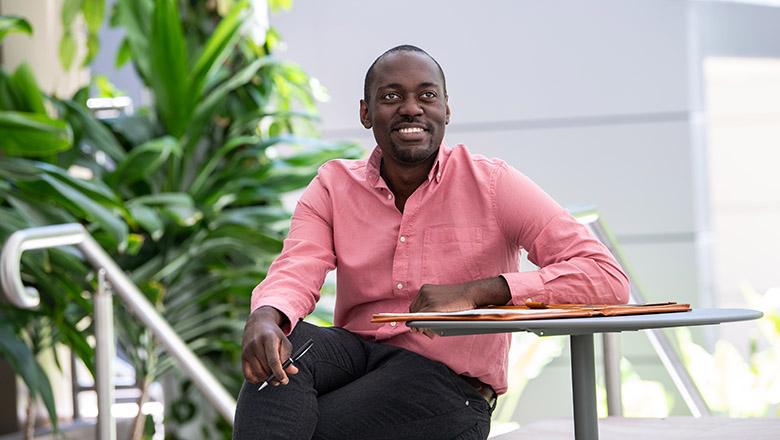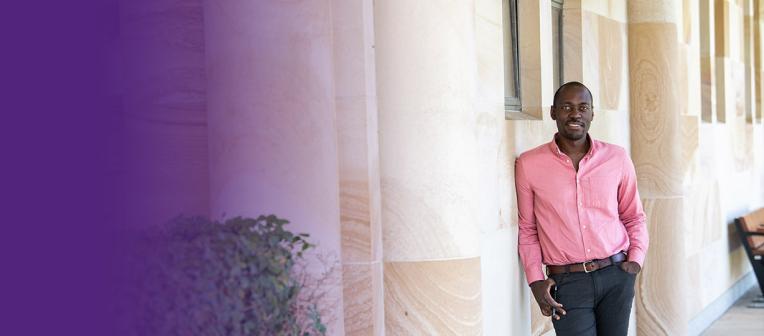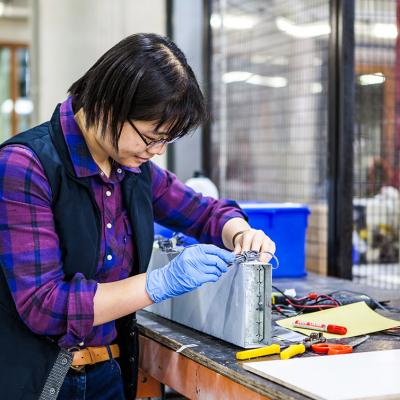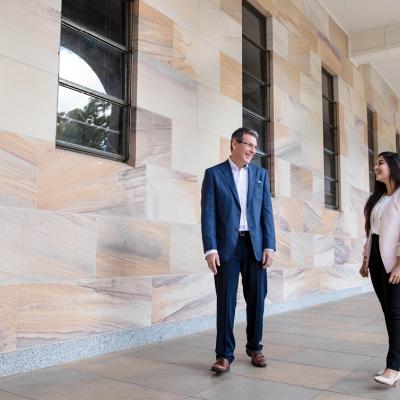Your PhD adviser will play a key role in ensuring your Doctor of Philosophy is a rewarding and enjoyable experience.
Choosing a PhD supervisor can therefore be a daunting prospect. But we’ve enlisted the help of UQ PhD adviser and researcher Dr Loic Yengo to pinpoint exactly what you should be looking for. He also has some tips for maintaining a positive and fruitful working relationship with your PhD adviser throughout the typical 3-4 years of your candidature.
This article covers:
- the role of a PhD supervisor
- how to choose a PhD supervisor
- the qualities of a good PhD supervisor
- tips for the first meeting with a PhD supervisor
- how to maintain a positive relationship with a PhD supervisor
- how to give and receive PhD supervisor feedback
- advice for ensuring a mutually beneficial relationship between candidate and adviser.
While the traditional and widely used term is ‘PhD supervisor’, here at UQ, we often say ‘PhD adviser’ to emphasise the purpose of the role, which is to advise rather than manage. However, we use both titles interchangeably throughout this article.
Meet Dr Yengo: UQ PhD adviser and Group Leader of the Statistical Genomics Laboratory, Institute of Molecular Bioscience (IMB)

Doctor Yengo’s research involves matching genetic differences with particular character traits to help predict how societies will evolve. He is currently an adviser to 3 PhD candidates whose research topics are in a similar vein.
“PhD candidates in my lab work on a wide range of projects connected to the analysis of large-scale datasets containing DNA sequences of millions of individuals from across the world,” says Dr Yengo.
“One project is about using DNA patterns to understand how people choose their spouses; another one is about discovering genetic variations that cause disease in specific populations.”
The findings could help policymakers and health professionals better prepare for – and therefore reduce the burden of – genetic disorders and diseases. But how do Dr Yengo and his team draw meaning from such vast quantities of data?
“For each project, we often develop novel statistical techniques to analyse these large volumes of data to answer the fundamental questions that we are interested in,” he says.
“By ‘developing' novel statistical techniques, I mean deriving the maths underlying the algorithms, and also programming these algorithms into new software tools.”
“Our research is intrinsically multi-disciplinary but we do love maths and stats in the Lab!”
The role of a PhD supervisor
When it comes down to it, what exactly is the role of a PhD supervisor? And how will a good PhD adviser guide you with your research?
For Dr Yengo, it’s about achieving a balance between teaching practical skills and providing inspiration and support for the PhD candidate to pursue their passion.
“I believe that the role of a PhD supervisor is to help the candidate develop their own program of research, eventually,” he says.
“That includes teaching key skills such as reading a lot, asking the relevant questions, managing time and energy (this is a hard one) and not being afraid to dream big!”
The role of a PhD supervisor can essentially be broken down into 3 key areas:
- advising and guiding on the research process and research topic
- being an advocate for your PhD candidate – providing encouragement and opportunities, and helping them to open doors by introducing them to your networks
- being a role model – modelling integrity and championing others’ success.
Choosing a PhD supervisor
Choosing a PhD supervisor can be a tricky business. Undertaking your Doctor of Philosophy is a lengthy process, so you’re going to be in a professional relationship with your supervisor for a pretty long time. The pressure is on to find ‘the one’. But how do you know they’re going to be the right fit? Dr Yengo has a few tips to help you reach a conclusion.
The first step? Ironically, it’s doing your research on the researcher.
“I would suggest researching what the supervisor works on and what they have published before,” says Dr Yengo.
You need a strong alignment between your proposed project and your supervisor's area of expertise to ensure they'll be able to provide you with sufficient (and specific) guidance.
Step 2 is, to put it bluntly, shopping around.
“Engage in informal chats with potential supervisors early in the process, especially when you are undecided,” says Dr Yengo.
“These discussions can help you form your own research questions and define a suitable direction for your research.”
It's also worth looking for any opportunities to work with prospective advisers before locking them in. This might mean engaging with them through an honours or summer research project, or even working with them as a research assistant. Doing so will give you a chance to check if their approach suits you.
Get tips on how to choose a PhD supervisor from UQ alumni, or hear from UQ PhD advisers about the best ways to approach a PhD supervisor.
Qualities of a good PhD supervisor
A good PhD adviser requires a careful balance of traits and skills. You want them to provide guidance without being overbearing, and to offer advice while letting you figure things out yourself too. There's a lot to consider when choosing a PhD supervisor, so Dr Yengo has helped us pinpoint a few of the most important qualities to look out for.
The first and arguably most critical is more of a requirement than a quality, and it’s that your potential PhD adviser is simply available. They need to have the time and energy to commit to you and your PhD.
A few other essential qualities of a good PhD supervisor are:
- clear communicator
- dependable
- generous (willing to share their time and wisdom to help you develop as a researcher)
- caring and approachable
- a leader in their field of research
- open to learning from others
- promotes a healthy work/life balance.
Dr Yengo explains that it’s important for a PhD adviser to be both a coach and a mentor, where as a coach they will help you find your own solution, and as a mentor they would share their experience and lead by example.
Tips for the first meeting with a PhD supervisor
The first meeting with a PhD supervisor is the time to outline expectations of both the adviser and candidate. You'll want to have a transparent discussion about what you both want the project and working relationship to be like, including:
- how often you'll meet
- what resources and support they'll provide you with
- what you both expect the impact of the PhD project will be.
When Dr Yengo approaches the first meeting with his PhD candidates, he likes to find out:
- What is motivating the student to start a PhD?
- What are their technical skills and why are they interested in the topic?
- What are their career aspirations after completing their PhD? (Note that this can change in the process of doing a PhD.)
Heading into your first meeting prepared to outline your expectations and listen to theirs, and answer these questions, is a good way to create a solid foundation for the relationship between you and your PhD adviser.
The PhD supervisor relationship: keeping it positive
When it comes to maintaining a positive working relationship between PhD adviser and candidate, Dr Yengo believes the focus should be on the process, rather than the outcome. Ideally, the supervisor should have an active interest in your development as a researcher (not just the research itself).
Dr Yengo says regular meetings are important for this reason. It encourages candidates to ask questions and share updates on their work.
“Candidates don’t have to wait until (they think) they have solved all the problems before discussing with their supervisor. This is often very counterproductive,” he says.
“Supervisors should create a culture that welcomes questions and mistakes, because that’s what it takes to learn.”
Ongoing discussions about your career plans can help ensure the research experience is always contributing to your career goals, setting you up for success both during and after your PhD.
Giving and receiving PhD supervisor feedback
A huge part of the PhD adviser and candidate relationship is giving and receiving feedback. And doing this effectively is essential.
“The most important thing is to understand that feedback is part of the learning cycle,” says Dr Yengo.
“Feedback is never a definitive assessment or an exam; therefore, it should emphasise what can be improved in any given situation and towards a well-specified objective (e.g. a paper or a specific analysis).”
For a PhD candidate, ideal feedback will be:
- critically thought-out
- constructive, with clear guidance on how to improve
- positive (i.e. including highlights and improvements)
- consistent over time
- timely.
If your feedback isn't meeting these standards, don't hesitate to ask for additional detail or more guidance. You should also acknowledge when you do receive feedback, and it's even OK to disagree with it (respectfully). Explaining why you don't agree with feedback can actually be a valuable way of developing your capability to justify and defend your thesis.
Plus, when it comes down to it, feedback isn’t only for the adviser to give.
“Both candidate and supervisor should be patient and willing to learn from each other,” says Dr Yengo.
Making it mutually beneficial
Like all relationships, the one between a PhD adviser and candidate is a two-way street. Both must be invested in the working relationship for it to flourish. While the purpose of the process may be for the candidate to receive guidance and advice, you can also have a lot to offer your future adviser too.
“Interacting with PhD candidates can be extremely exciting as they often get a fresh perspective on problems,” says Dr Yengo.
“The professional relationship flourishes when we equally want to know the answer to the question. This can lead to fast and productive cycles of discussions, which often generate the most creative ideas.”
So, what makes a good PhD supervisor? Balance. Balance between professional and personal approaches to work and life, constructive and positive feedback, coaching and mentoring, leading and learning. Search for an adviser who can demonstrate balance in these areas, and you’re sure to have an enriching PhD experience.
Ready to pursue your passion for research with a Doctor of Philosophy?






